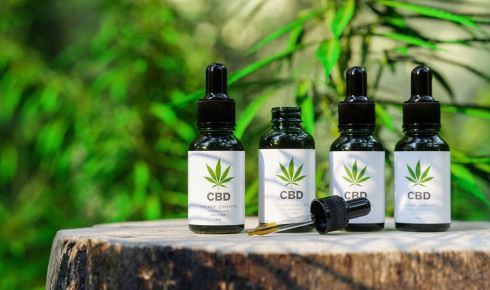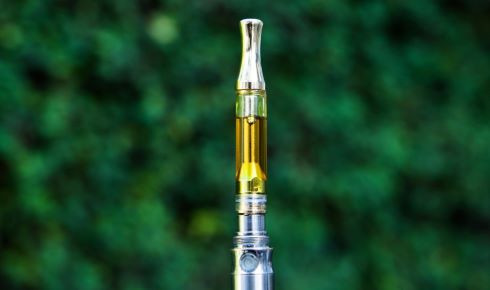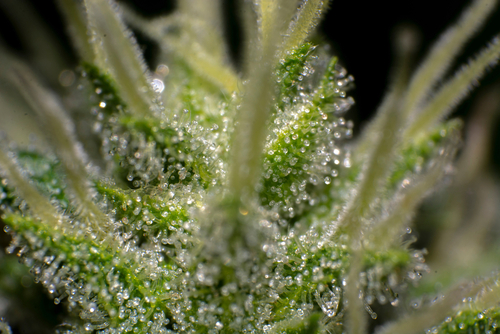Cure-all or con?

September 11th 2023
Every year millions of people buy cannabis-based products to self treat a range of healthcare issues, from insomnia to inflammation – but many of these new products do not contain what they say they do, and the evidence they have any effect is limited, writes Tom Ireland
The sudden proliferation of legal cannabis-based products in the past decade has been nothing short of extraordinary. A truly vast range of items containing cannabis-derived cannabidiol, better known as CBD, is now available to consumers – from oils, sweets and capsules in online health stores to cosmetics and vape liquids on the high street. You can even find fizzy drinks, face masks, nail varnish and sportswear infused with CBD.
Why? The reason for the buzz is, of course, the idea that CBD is a natural wonder compound that can help alleviate a range of health conditions, from anxiety and insomnia to chronic inflammation and pain.
However, despite promising pharmaceutical research on CBD’s therapeutic effects, there is actually very little evidence that CBD has any effect in the low doses available in these non-prescription products. What’s more, analysis suggests these products are often mislabelled – containing far less or more CBD than advertised. Moreover, some contain potentially hazardous chemicals, such as industrial solvents or synthetic cannabinoids, or traces of THC (tetrahydrocannabinol), the illegal psychoactive component of cannabis.
The CBD boom
Just under 10 years ago, in 2014, The Biologist was one of the few publications reporting on the potential therapeutic effects of CBD, a non-psychoactive compound found in wild-type cannabis1. The compound then was relatively unknown compared with THC, the compound in cannabis that gives recreational users a high.
Data from experimental studies and clinical trials suggested that pharmaceutical-grade CBD could help reduce anxiety2 and psychotic symptoms3, has beneficial effects in the treatment of childhood epilepsy4 and has potential as an anti-inflammatory agent5. This promising research quickly led to campaigns to allow better access to medical cannabis, but also a massive rise in consumer interest in CBD.
 Today the health and wellbeing market is awash with CBD-themed products
Today the health and wellbeing market is awash with CBD-themed products
Initially, vitamin-like capsules and droppers containing CBD oil began to appear in health shops, before the range of items available exploded into the dizzying number of CBD products seen today. These products are mostly classified as ‘novel foods’ – meaning they are regulated by the Food Standards Agency, and sellers should not be making any medical claims about them. (Cosmetic products containing CBD are regulated separately.)
As of 2019, over-the-counter CBD in its various forms was being bought by over 1.3 million people a year in the UK, a market worth an estimated £300m – that’s more than the vitamin C and vitamin D markets combined6. In the US the CBD market is forecast to be worth $16bn in the next few years.
Quality control
Most CBD products are made by adding solvents to raw cannabis plant material. The plants used tend to be breeds with extra-low levels of the illicit compound THC, which in the UK can be grown with a licence (it is impossible to breed plants with no THC at all). The resulting extract is cooled and fractionated so that unwanted compounds with different melting points are removed. In so-called ‘full spectrum’ CBD oils a mix of other cannabinoids and plant turbines is intentionally left in the mixture.
The production of THC and CBD in cannabis plants is governed by a pair of co-dominant alleles, meaning plants can produce either mostly THC, mostly CBD or a mixture. Decades of breeding among recreational cannabis users has led to the proliferation of super-high-strength ‘skunk’ cannabis, which has high levels of THC but little or none of the ‘neuroprotective’ CBD found in wild or lower-strength cannabis.
A 2022 analysis of 29 of the most popular CBD oils available in the UK7 found that only 11 had a CBD content within 10% of what was advertised on the label. One product had zero CBD.
Over half (55%) of products had measurable levels of THC (or CBN, another psychoactive cannabinoid), making them technically illegal to be possessed within the UK. Other cannabinoids were often present too: a mix of compounds from the cannabis plant such as cannabigerol (CBG), tetrahydrocannabinolic acid (THCA), tetrahydrocannabivarin (THCV), cannabigerolic acid (CBGA) and cannabichromene (CBC).
The researchers also looked for solvents and heavy metals present in these oils. They found significant levels of not-hugely-healthy-sounding solvents, including ethyl acetate, n-pentane and isopropanol, and, in tiny quantities, heavy metals such as lead and arsenic.
The study’s authors note that similar analyses from other countries led to similar findings. In the US a study of 84 CBD products found that fewer than a third (31%) were accurately labelled (within 10% of advertised CBD content) and THC was detected in 18 of the samples. A study in the Netherlands showed that only five of 46 products were within 10% of the labelled CBD content.
CBD vape products seem to be particularly unreliable: one study of CBD vape liquids in the US found the presence of a potent synthetic cannabinoid in four different products, and in one case a compound from the same class of medication as morphine. In Utah, US, a ‘CBD’ product containing a synthetic cannabinoid and no CBD caused severe adverse reactions in more than 50 people, with many requiring hospital treatment for seizures, confusion, loss of consciousness and hallucinations.
 In tests, CBD vape products were particularly unreliable in terms of labelling
In tests, CBD vape products were particularly unreliable in terms of labelling
The low dose conundrum
Even in higher-quality over-the-counter CBD products that are labelled accurately, are people likely to feel any benefit? The amazing popularity of these products suggests so. However, evidence from controlled scientific studies is lacking.
In clinical trials of CBD-based pharmaceutical products, a typical CBD dose is as high as 1,000mg/day. However, most over-the-counter preparations contain much smaller amounts: even the strongest products only offer around 20mg per dose and many contain far less – typically less than 5mg per dose.
The authors of one review of CBD products in 2020 found just eight clinical trials had examined the effects of CBD at low doses. “Most of these studies were small and reported limited efficacy with few adverse effects,” the authors write8.
In studies investigating CBD for alleviating anxiety – one of the most common reasons people take CBD products – data suggests only doses of 300mg and above reduced symptoms, with lower doses having no effect2,9.
A very recent study found that relatively low-dose cannabinoids could lead to improvements in anxiety, sleep quality and quality of life - but focused on a combination of medical-grade THC and CBD10.
Dr David Potter, one of the UK’s leading experts on cannabis, wrote in a recent report for UK law enforcement and forensic agencies that “doctors generally agree that there would be no pharmacological effect from the small dose of CBD in over-the-counter products, yet they have become very popular”. Potter, who helped develop the world’s first licensed CBD-based drug, Sativex, for multiple sclerosis, followed by Epidiolex, for forms of epilepsy, suggests that the ‘plant-based’ nature of the products, alongside the enduring perception of cannabis as ‘cool’, could be behind their soaring popularity.
An unmet need?
Amid claims of varying quality and specious health benefits, what does this mean for the millions of people who buy CBD products every year?
The fact that consumers may not be receiving the exact ‘dose’ of CBD they think they are is perhaps the least concerning issue, given that the pharmacological effects at these doses may be negligible anyway. More concerning is people turning to these products for serious health conditions rather than established and clinically proven treatments. Online surveys have found that most CBD purchases are made to alleviate anxiety or insomnia, but others are buying them to treat post-traumatic stress disorder, depression, chronic pain, epilepsy, gastrointestinal disorders and even cancer8.
Although most CBD sellers are careful not to make outright medical claims on their packaging or websites, it is not hard to find information online that perpetuates the idea that over-the-counter CBD products can be used to treat a range of health issues, while also stoking distrust and fears of conventional medicines.
Regular users may be ingesting or inhaling a mix of cannabinoids and solvents, the long-term effects of which are not known. Stories of medically vulnerable populations turning to unregulated CBD vape liquids are particularly worrying.
The authors of the 2022 review of CBD products conclude by saying that their findings “add to the accumulating evidence that there needs to be increased regulation of CBD products to protect consumers”. This regulation could include tighter checks on what is actually in CBD products, and stricter rules on what can be said about CBD on packaging and sales platforms.
We should also be asking why so many people are turning to these ‘novel food’ products in the first place. In the UK, where there are long waiting times to access NHS mental health services, CBD products offer people the promise of a simple, ‘natural’ fix that can be bought anonymously online. High-dose pharmaceutical grade CBD, which has been proven to help with anxiety and some forms of epilepsy, is currently not widely available in the UK.
More research is needed, focused specifically on low doses of CBD, so users can at least make informed choices before parting with their cash. Research is also needed to understand the effect of long-term low-level CBD use, especially in adolescents, who are often regular users. (The body’s endocannabinoid system, upon which CBD acts, has an important role in neurodevelopment.)
However, for now, should you wish, you can lay back on a CBD-infused pillow with a can of CBD health drink, puffing on your CBD vape, all in the name of ‘wellbeing’. Until more conclusive research is done, the CBD boom looks set to continue unabated for a long time to come.
With thanks to Dr David Potter FRSB for his input to this article.
 Cannabis sativa is dioecious (separate male and female plants) and only the female plants secrete cannabinoids. These sticky oils are held in tiny structures called trichomes. The structures and their contents are thought to be involved in trapping insects and making the plant taste bitter to herbivores.
Cannabis sativa is dioecious (separate male and female plants) and only the female plants secrete cannabinoids. These sticky oils are held in tiny structures called trichomes. The structures and their contents are thought to be involved in trapping insects and making the plant taste bitter to herbivores.
1) Potter, D. ‘Herbal remedy’. The Biologist 61(4), 16–19 (2014).
2) Zuardi, A.W. et al. Inverted U-shaped dose-response curve of the anxiolytic effect of cannabidiol during public speaking in real life. Front. Pharmacol. 8, 259 (2017).
3) McGuire, P. et al. Cannabidiol (CBD) as an adjunctive therapy in schizophrenia: a multicenter randomized controlled trial. Am. J. Psychiatry 175, 225–231 (2018).
4) Devinsky, O. et al. Trial of cannabidiol for drug-resistant seizures in the Dravet syndrome. N. Engl. J. Med. 376, 2011–2020 (2017).
5) Burstein, S. Cannabidiol (CBD) and its analogs: a review of their effects on inflammation. Bioorg. Med. Chem. 23, 1377–1385 (2015).
6) Gibbs, B. et al. CBD in the UK (Centre for Medicinal Cannabis, London, 2019).
7) Liebling, J. P. et al. An analysis of over-the-counter cannabidiol products in the UK. Cannabis. Cannabinoid Res. 7(2), (2022).
8) Chesney, E. et al. Lack of evidence for the effectiveness or safety of over-the-counter cannabidiol products. Ther. Adv. Psychopharmacol. 10 (2020).
9) Linares, I. M. et al. Cannabidiol presents an inverted U-shaped dose-response curve in a simulated public speaking test. Braz. J. Psychiatry 41, 9–14 (2019).
10) Rifkin-Zybutz, R. et al. Clinical outcome data of anxiety patients treated with cannabis-based medicinal products in the United Kingdom: a cohort study from the UK Medical Cannabis Registry. Psychopharmacology 240, 1735–1745 (2023).


